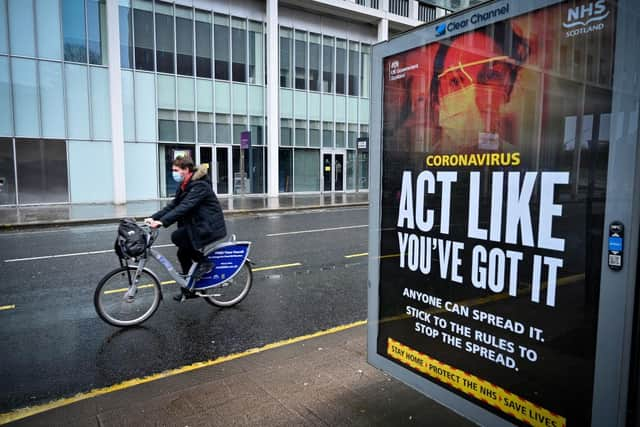Covid in Glasgow: Cases spike follows India not being put on UK red travel list, says expert
Local outbreaks centre mostly in the south of the city, around Pollokshields and Govanhill, as well as a pocket in the east in Easterhouse.
Rates of Covid per 100,000 population are much higher in these areas than Scotland as a whole, with Pollokshields East at 575, almost 23 times that of the Scotland-wide rate.
Advertisement
Hide AdAdvertisement
Hide AdProfessor Linda Bauld of Edinburgh University said the outbreak is a result of India not having been put on the UK’s “red” travel list earlier.


While genomic sequencing has not yet been confirmed, NHS Greater Glasgow and Clyde suggested some new cases may be the variant of concern first identified in India, B16172, which is thought to be more transmissible than the current “Kent” variant.
“I think this is a consequence of the UK government not putting India on the red list quickly enough,” said Prof Bauld.
"We have certainly seen in England that the B16172 cases in Bolton and elsewhere were linked to people who travelled from India before it went on the red list.
“So we may still be dealing with that and of course, we know from Scottish government and others have admitted themselves that the quarantine system that we put in place people can easily get around it because they just travelled to an English airport, and that meant that they weren't having to go into a quarantine hotel in Scotland.”
Prof Bauld called for the UK Government to be “very cautious” on opening up international travel.
“I do think it has to be a four nations approach because we've seen the Scottish system being evaded. There's a big push to get travel opened up again, [and] everybody in public health is saying it's not a good idea,” she said.
Adding more countries to the green list would be a “mistake”, she added.
Advertisement
Hide AdAdvertisement
Hide AdBoris Johnson said the addition of India to the red list in April was a “purely precautionary” step, and attributed the delay to it not having been designated a variant of concern at that point.
Prof Bauld said the outbreak should not affect the easing of restrictions in Glasgow as a whole on Monday, but suggested some localised restrictions may be necessary.
The first step is to take action to combat spread, she said, which includes door-to-door testing and an urgent rollout of vaccines to everyone over 18.
"Glasgow City is the biggest local authority in Scotland, with over 600,000 people,” she said.
"These clusters are concentrated in particular postcode areas and the first step is not to say to the whole city ‘sorry you can't move’. The first step is to try and get on top of those outbreaks locally, and that means two things. Firstly surge testing, not just politely asking people to go and pick up a lateral flow test – that doesn't work – but potentially door-to-door, and having mobile testing sites in convenient locations.
“The second thing is let’s accelerate the vaccine delivery in those areas, including to younger adults. They've already started to do that in Moray, so I don't see why they can't do it in Glasgow.”
A message from the Editor:
Thank you for reading this article. We're more reliant on your support than ever as the shift in consumer habits brought about by coronavirus impacts our advertisers.
If you haven't already, please consider supporting our trusted, fact-checked journalism by taking out a digital subscription.
Comments
Want to join the conversation? Please or to comment on this article.
